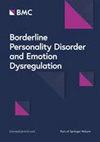Transdiagnostic skills training group of dialectical behavior therapy: a long-term naturalistic study
IF 4
2区 医学
Q1 PSYCHIATRY
Borderline Personality Disorder and Emotion Dysregulation
Pub Date : 2023-12-21
DOI:10.1186/s40479-023-00243-y
引用次数: 0
Abstract
Dialectical Behavior Therapy (DBT) has assembled a large body of evidence for the treatment of emotional dysregulation in borderline personality disorder (BPD), but also in other disorders characterized by emotional dysregulation (e.g., bipolar disorder (BD) and ADHD). Standalone skills learning groups address the problem of limited resources in several clinical settings. Furthermore, transdiagnostic skills groups facilitate the recruitment and decrease the scattering of resources in psychiatric settings. However, few studies have focused on the pertinence of transdiagnostic standalone skills groups in naturalistic settings as well as their long-term outcomes. The goal of this study is to assess the impact of participation in a transdiagnostic DBT skills group one year after its completion. Transdiagnostic DBT skills training groups were provided for BPD, BD and ADHD patients in a University Psychiatric Department (Strasbourg, France), between 2019 and 2020. They consisted of 16 group sessions of 2.5 h and 3 individual sessions. At 1-year follow-up, ad-hoc questionnaires were proposed to all participants to assess the perceived impacts, the changes in symptomatology, and the maintenance of skills learned. 22 of the 31 participants were interviewed at the one-year post-group session (64% BPD, 41% ADHD and 27% BD). 73% participants estimated that group impact was important or very important, 64% stated using the skills learned often or very often, mainly emotion regulation skills. An improvement in emotional instability, substance use, impulsivity and suicidal thoughts was reported by respectively 100%, 91%, 86% and 85% of participants. Quality of life improved according to 90% participants. All patients reported an improvement in suicidality during the post-group year, especially in suicide attempts. Psychotropic medication decreased in 59% of participants. Our one-year naturalistic study suggests that transdiagnostic DBT skills training groups are promising for the treatment of emotional dysregulation in people with BPD, BD and/or ADHD. The observational design and the lack of control group are the main limitations. Randomized controlled studies are required to confirm the long-term efficacy of transdiagnostic skills learning groups in naturalistic settings.辩证行为疗法的跨诊断技能培训小组:一项长期自然研究
辩证行为疗法(DBT)在治疗边缘型人格障碍(BPD)以及其他以情绪失调为特征的疾病(如双相情感障碍(BD)和多动症)的情绪失调方面积累了大量证据。独立的技能学习小组可以解决一些临床环境中资源有限的问题。此外,跨诊断技能小组还有助于招募人员,减少精神病治疗机构资源的分散。然而,很少有研究关注跨诊断独立技能小组在自然环境中的相关性及其长期效果。本研究的目的是评估参加跨诊断 DBT 技能小组一年后的影响。跨诊断 DBT 技能培训小组于 2019 年至 2020 年期间在一所大学精神病学系(法国斯特拉斯堡)为 BPD、BD 和 ADHD 患者提供培训。这些小组包括 16 节 2.5 小时的小组课程和 3 节个人课程。在为期一年的随访中,对所有参与者进行了临时问卷调查,以评估感知到的影响、症状的变化以及所学技能的保持情况。31 名参与者中有 22 人(64% 患有 BPD、41% 患有 ADHD 和 27% 患有 BD)在小组活动一年后接受了访谈。73%的参与者认为小组的影响重要或非常重要,64%的参与者表示经常或非常经常使用所学技能,主要是情绪调节技能。分别有 100%、91%、86% 和 85% 的参与者表示情绪不稳定、药物使用、冲动和自杀念头有所改善。90%的参与者表示生活质量有所改善。在小组结束后的一年中,所有患者的自杀倾向都有所改善,尤其是自杀未遂。59%的参与者减少了精神药物治疗。我们为期一年的自然研究表明,跨诊断 DBT 技能训练小组有望治疗 BPD、BD 和/或 ADHD 患者的情绪失调。观察性设计和缺乏对照组是研究的主要局限性。需要进行随机对照研究,以确认在自然环境下跨诊断技能学习小组的长期疗效。
本文章由计算机程序翻译,如有差异,请以英文原文为准。
求助全文
约1分钟内获得全文
求助全文
来源期刊

Borderline Personality Disorder and Emotion Dysregulation
Psychology-Clinical Psychology
CiteScore
6.00
自引率
9.80%
发文量
30
审稿时长
28 weeks
期刊介绍:
Borderline Personality Disorder and Emotion Dysregulation provides a platform for researchers and clinicians interested in borderline personality disorder (BPD) as a currently highly challenging psychiatric disorder. Emotion dysregulation is at the core of BPD but also stands on its own as a major pathological component of the underlying neurobiology of various other psychiatric disorders. The journal focuses on the psychological, social and neurobiological aspects of emotion dysregulation as well as epidemiology, phenomenology, pathophysiology, treatment, neurobiology, genetics, and animal models of BPD.
 求助内容:
求助内容: 应助结果提醒方式:
应助结果提醒方式:


